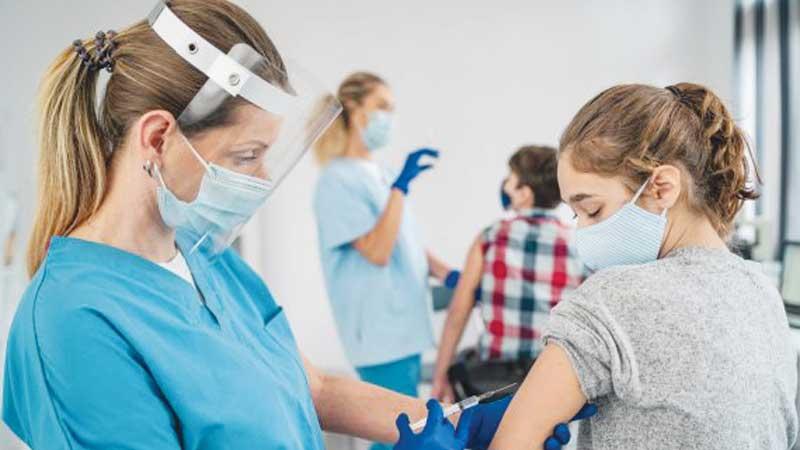
Being double vaccinated still offers the best protection against the Delta variant, first identified in India and now dominant in the UK, according to a new study.
But people who have had both doses can still catch and transmit the disease, so researchers say it is essential that as many people are possible get the jab.
Everyone aged 16 and over in the UK can now receive the Covid vaccine.
What are the plans for vaccinating teenagers?
Over-16s are now being offered a single dose of the coronavirus vaccine across the UK.
All 16-17-year-olds in England will be offered their jab by 23 August, the Government has said.
There are an estimated 1.4 million people in this age group. NHS England says that more than 360,000 have already received the vaccine, including those eligible because of an underlying health condition.
People in this age group don’t need parental consent, as they are considered capable of making their own medical treatment decisions. GPs are also inviting at-risk children aged between 12 and 15, who are clinically vulnerable to Covid or live with adults who are at increased risk of serious illness from the virus, to get vaccinated. Around 30,000 children in this age group have had the jab.
There are currently no plans to vaccinate healthy children of this age. How many people have been vaccinated in the UK so far?
More than 47m people - nearly 90 percent of the adult population - have had their first dose. Almost 41m people (77 percent of UK adults) have now received both Covid jabs.
Under-30s only became eligible for the vaccine in June. So far about two-thirds of 18-29-year-olds in England have received at least one jab. In Scotland and Wales, the figure is about 75 percent.
How effective are the vaccines?
The risk of becoming ill from Covid is about 90 percent lower if you’ve been jabbed.
People who have had the vaccine can still catch and transmit the disease.
Two doses
A small number may sadly die.
But according to the largest study of its kind, having two doses of Covid vaccine remains the best way to protect yourself against the Delta variant, which is now the most common variant in the UK.
After four or five months, the study suggests you have the same amount of protection whether you had AstraZeneca or Pfizer.
Neither is as effective against Delta as they are against the Alpha variant, which was responsible for most UK infections last winter.
Researchers don’t yet have enough data to compare the Moderna jab, but believe it is “almost certainly at least as good as the others”.
The study also shows that younger people gain more protection from being vaccinated than older people.
Do I have to have the vaccine?
Covid vaccines are not compulsory, but everyone is being urged to get jabbed, to protect themselves, their family, friends and wider society.
Younger people are less likely to die from Covid-19. But at the beginning of August, a fifth of those in hospital in England are aged 18-34.
Without a jab you may not be able to do certain jobs. And some countries only allow fully vaccinated travellers to enter.
People with both jabs don’t have to self-isolate on return to the UK from amber list countries, or if they come into close contact with someone who tests positive.
The Government has also said clubbers and people attending some other venues in England will have to be fully vaccinated by the end of September.
What if I’m pregnant or breastfeeding?
Doctors and midwives are urging pregnant women to get a vaccine, to protect themselves and their babies.
Coronavirus can cause serious illness in some women in later pregnancy, and possibly a slightly higher rate of stillbirth.
You are encouraged to discuss any questions you have with your GP or midwife.
If you’re planning a pregnancy or are breastfeeding you can still get vaccinated, Government guidance says.
Side effects
What are the side effects?
Most are mild, completely normal and disappear after a few days.
They happen because the body’s defences are reacting to the vaccine, and include: a sore arm, tiredness, fever, headache and feeling sick.A very small number of people have experienced a severe allergic reaction after the Pfizer and Moderna vaccines, and you should discuss any allergies you have before vaccination.
There have been reports that a very small number of young people developed inflammation of the heart muscle after receiving the vaccine. However, they would be much more likely to develop the condition from Covid itself.
What if I’ve got long Covid?
A recent study suggests vaccination can help improve long Covid symptoms. The vaccine could be pressing the body’s reset button and helping it recover, researchers say.
-BBC
